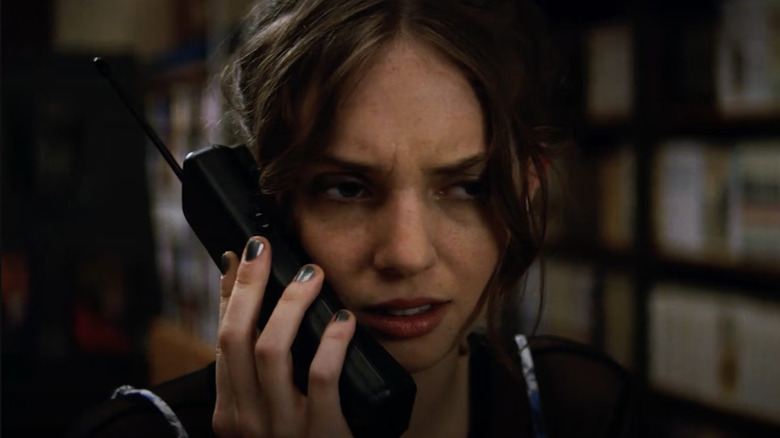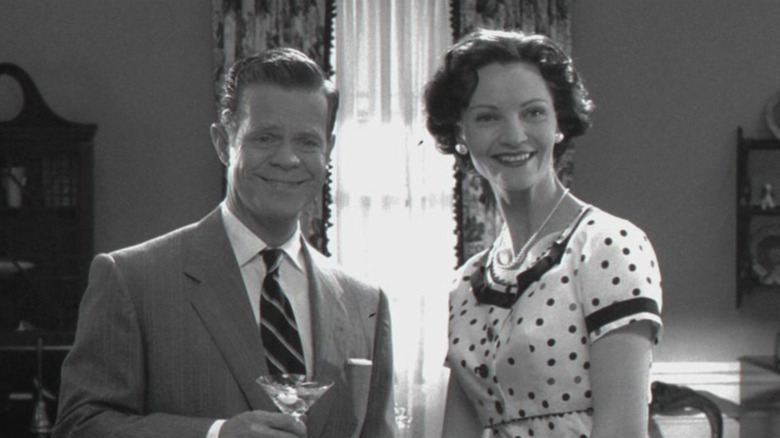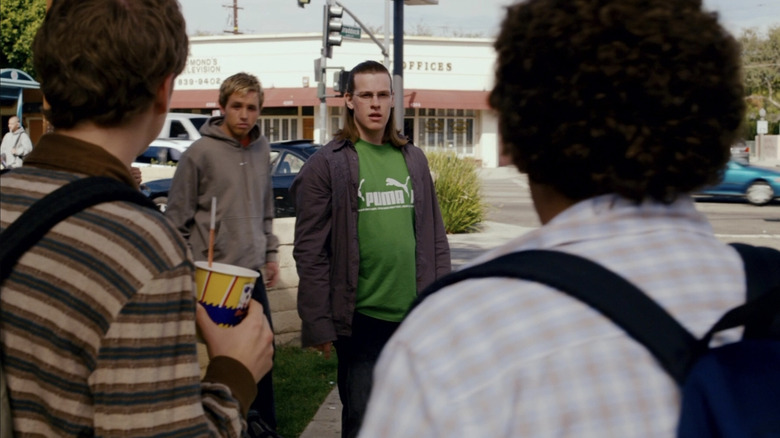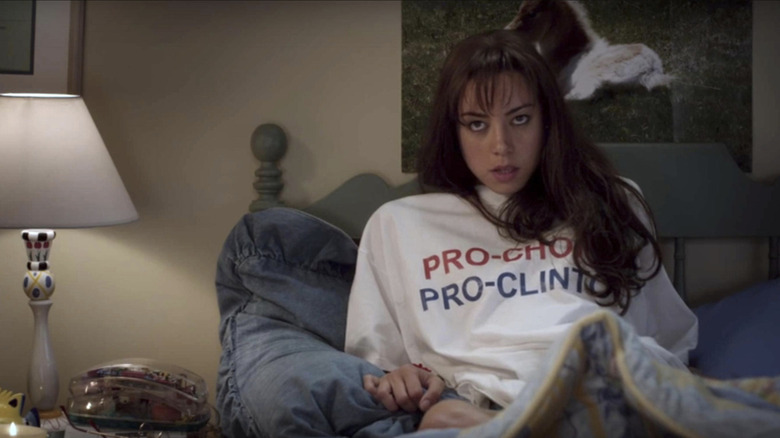The '90s Are Now A Period Piece — Here's The One Thing Movies Are Getting Wrong
The year was 1999 and as congratulations for my group's project getting the highest score in the class, our teacher invited us to have lunch in her room for a week to watch a movie. We chose the Tim Allen/Sam Huntington flick "Jungle 2 Jungle," which includes a character played by a young Leelee Sobieski. As a 9-year-old, Sobieski was my first celebrity crush, and I accidentally mentioned that I had recently seen "Never Been Kissed" and that "she's so pretty" in the movie. One of the kids in my group was also the class bully, and he wasted no time pouncing on this slip-up. "Are you a d**e or something?" It wouldn't be the last time he'd call me that, nor would he be the only one to do it. After years of therapy — I'll fully admit that my years of hypersexual behavior with men in my teens and early 20s are directly related to being terrified that people would know the truth: he was right.
I can only speak for myself, my lived experiences, and the identity intersections that I inhabit, but the 1990s and 2000s were a pretty atrocious time to be perceived as gay, let alone living openly as such. Of course, it's still Not Great today, but the casualness, frequency, and social permissiveness of blatant bigotry was rampant. And it wasn't just gay people. Anyone who was marginalized in some way was dodging microaggressions and straight-up aggression on the daily. Hell, there was an entire ad campaign launched in 2008 called "Think Before You Speak" urging people not to say "gay" when they mean "stupid" or "bad." Like, colloquial homophobia was so pervasive that they hired Hilary Duff to star in commercials to tell people to tell people to knock it off.
This is why it's so weird to me that despite our current obsession with making movies set in the late '80s, 1990s, and early 2000s ... the attitudes of the time period are being defanged to the point of revisionist history.
The dangers of presenting the past as more progressive
Period pieces have existed as long as the film medium, but the popularity of coming-of-age stories incorporating nostalgia kicked off in 1973 with George Lucas' pre-"Star Wars" masterpiece, "American Graffiti." Although it was filmed in the 1970s, the film took place in the summer of 1962. Over the next half-century, countless filmmakers would tell stories attempting to evoke a feeling of yesteryear, specifically, their yesteryear — "Stand By Me," "Cooley High," "Dazed and Confused," "Crooklyn," "Now and Then," and even "Lady Bird" all thrust audiences back in time, capturing the charm of a bygone era in addition to the less-than-great circumstances that forged many of these characters by fire. It can (and should) be jarring to hear harmful language flippantly tossed around. Yet, to act as if characters in a story are operating under the same social norms as the time the film is being made rather than when it is set is not just ahistorical, but can have legitimately dangerous repercussions.
For example — the current Trad Wife movement is based on a presentation of heterosexual (and white) gender roles often associated with the 1950s, but it's a 1950s that people of the 2020s are imagining based on the idyllic way the decade has been presented in film and television. Women stay at home, make delicious homecooked meals from scratch, clean the house in a full face of makeup, and raise perfectly polite children. This is the "1950s Housewife" trope as many believe it to be, ignoring the fact that many housewives of this time period were also abusing amphetamines to handle their home workload. That part conveniently gets left out of portrayals of the time period, setting an impossible standard for real people to emulate and painting a portrait of America that might as well have been created with generative AI.
And sure, people should be learning about the past from history books or actual lived experiences from those who were alive to witness it firsthand. But Holocaust denialism exists despite Holocaust survivors existing and people forget the Selma to Montgomery march was so recent that it happened the same year the Rolling Stones — a band that still tours today – released "(I Can't Get No) Satisfaction". For a huge chunk of the population, what they see on TV and in the movies has a consequential impact on their worldview and how they remember history.
The difference between authenticity and edgelord provocation
Let's make one thing explicitly clear: there's a big difference between presenting with authenticity and thinking it makes you cool to use "edgy" language. For example, in "Bill & Ted's Excellent Adventure," fans often forget the spontaneous use of the f-slur after they hug and call each other before laughing it off. In this instance, the usage is a reflection of how casually the word was used by everyone at the time of filming — not just hateful bigots. If the film was made today, they'd never say it because hero characters of today wouldn't say it with a negative connotation, even if the film is set in a time that would have been true to the period (looking at you, "Mid90s"), because the point can be made elsewhere.
And that "elsewhere" is by allowing bigots, bullies, and bad apples to be representative of the genuine viciousness that actually existed.
As much as I love "Fear Street: 1994" and recognize that it is a fantastical version of the year, the fact that two characters are in a lesbian relationship with one being closeted out of fear, but it's never shown why the character would be afraid to come out, dilutes the impact of that major theme. In Kyle Mooney's extremely funny and hyperspecific to 1999 horror-comedy "Y2K," Eduardo Franco's bully character insults just about everyone around him. He slut shames one of his friends and he's constantly picking fights with people, but when he bullies two best friends by rapping about what losers they are ... he never once implies that they're gay or tosses in a homophobic slur. Eminem is one of the biggest rappers in the world, but we're going to pretend a rap-obsessed teenage bully in the suburbs wouldn't have dropped an f-bomb on these boys? Despite being set eight years later, it would have looked a lot more like the bullying scene in "Superbad."
I understand the desire to not alienate modern audiences who would object to the language, but sugar-coating the behavior betrays the experiences those of us on the receiving end lived through and diminishes the memories of those who didn't survive it. We don't need to include targeted hatred for the sake of hatred, but if we're including characters who spew hatred, we can't pretend it didn't exist like this.
How Hollywood can get it right
Including harsh or oppressive language is also not a mandatory inclusion for a period piece to be effective. In Annie Baker's debut "Janet Planet," the summer of 1991 is beautifully captured without slurs being treated like pedestrian language because the words would not be true to any of the characters in the film. In "Didi," another coming-of-age film (set in 2008), a character asking another if he's a "Fremont Asian Gangster" (look at the first letter of each word) perfectly reflects the psychological warfare of middle school boys.
Adam Rehmeier's "Snack Shack" understands the mouthy, often out-of-pocket language of teenage boys in 1991 Nebraska — which shouldn't be surprising considering how well he captured the casual oppression of language in the Midwest today in "Dinner in America" — but does so without the script ever feeling like an excuse to say swears. One of the best examples is Maggie Carey's "The To-Do List," which stays grounded as an outlandish '90s-set sex comedy by keeping the period sincere.
Currently, Gen-Alpha and younger Gen-Z teens have become fascinated with footage of high school students in the 1990s and 2000s, romanticizing it as "a simpler time," but without interrogating how rough it actually was for so many people because those moments typically weren't documented. This puts the onus on entertainment. Film has always been both an extension and reflection of the world around us, and being honest about it has always made art better.
But it's also an act of resilience, breaking a cycle of sanitizing the past in an attempt to avoid accountability. Being frank about the ugliness of our past is how we learn from it, see how far we've come, and recognize how far we still have to go. Pretending everything in the 1950s was perfect was why Ronald Reagan won his 1980 election on a platform to "Make America Great Again" and why we are once again seeing another presidential administration peddle the same falsehoods.
When I think back to my life in the 1990s and 2000s, the cruelty I faced was a vital component to the person I am today and to the story of my life. It would be nice if more films weren't afraid to showcase that.



